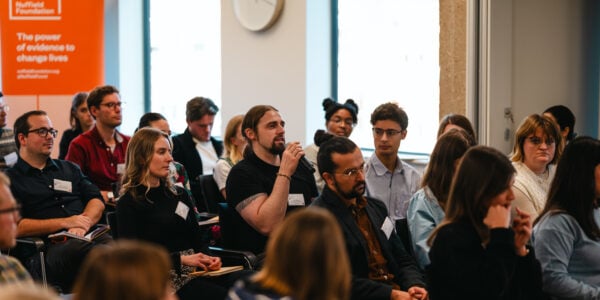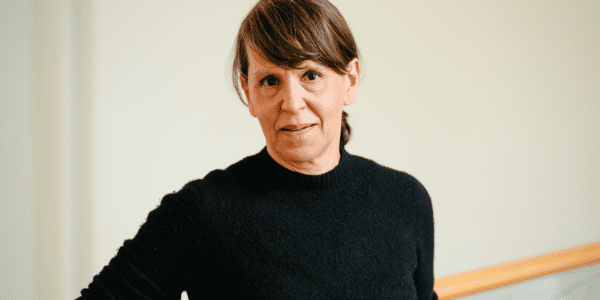Funding awarded to 21 projects to tackle inequalities and support social well-being
The Nuffield Foundation is delighted to announce support for 21 new projects in its latest funding round.
A total of £4.75m is going to a range of research teams across England, Scotland and Wales, for projects addressing key social issues affecting people’s lives.
Topics for research across our three main areas of interest – Education, Welfare, and Justice – include:
- Investigating the transitions of young people into good employment in East Birmingham and North Solihull
- Examining pension savings and retirement outcomes for low earners
- Exploring how to secure a sustainable future for the free legal advice sector
These projects join our portfolio of more than 200 active grants, with childhood charities Thrive at Five and Early Education, both receiving their first grant from the Foundation.
We look forward to working closely with our new grant-holders and supporting them to produce insights and evidence that address the inequalities, disadvantages and vulnerabilities that many people face.
New education projects
Implementing effective early education interventions at scale, led by Dr Christine O’Farrelly (University of Cambridge)
This project is evaluating the Playtime with Books programme, which supports families to engage young children (10-24 months) in high-quality book-sharing interactions to enhance early learning. The study will test the programme at scale in two local authorities, to support the large-scale roll-out of the intervention, and provide insights into the successful scaling of effective, early years interventions. Outputs will include an online programme, a training package, and an implementation guide.
A comparative analysis of EY workforce policy in the four UK nations, led by Professor Dame Cathy Nutbrown (Early Education)
This project aims to address the crisis in the UK early years workforce by comparing recent policies across the four home nations. The study involves a review of national and international literature and interviews with key stakeholders to identify successful policies and areas for improvement. The findings will highlight strengths and weaknesses of each nation’s systems, and generate ideas for policymakers to support effective early learning and improve outcomes for children.
Clear skies, clear minds: Air quality and children’s welfare, led by Dr Ludovica Gazze (University of Warwick)
This project is investigating the impact of air pollution on children’s health and educational outcomes in England since the early 2000s. The research will explore the short- and medium-term effects of pollution on educational attainment, physical health, and mental health, and how these interact. It will also explore if the quality of public services and amenities can mediate these effects. Using the new Education and Child Health Insights from Linked Data (ECHILD) dataset, the study will analyse the records of approximately 20m children in England aged 2-16. Findings will enhance understanding of how societal transformations, like net-zero, are shaping children’s futures through changes in local pollution, and will inform strategies to mitigate pollution’s detrimental effects.
The evaluation of Thrive at Five’s sites in Stoke and Redcar, led by Chris Welling (Thrive at Five)
This project evaluates Thrive at Five’s holistic, place-based model which aims to strengthen early years systems, practices and support pathways. Implemented in Stoke-on-Trent and Redcar and Cleveland, the model targets approximately 2,500 children aged 0-5 and their families. The research will conduct a mixed-methods implementation and impact evaluation. The research will explore if Thrive at Five is being implemented as intended, and if there is evidence of impact in the short, medium, and longer-term. The goal is to refine and replicate the model, influence national policy and practice, and improve early childhood outcomes in disadvantaged communities.
Examining the challenges and benefits of childminding in England, led by Professor Lynn Ang (UCL Institute of Education)
This project will examine the benefits and challenges of working as a childminder and explore the evidence about the impact of childminding and the characteristics of high-quality practice. The study will include an evidence review, a national survey, and interviews with childminders and parents. Workshops and meetings with stakeholders will help co-produce recommendations. Findings will inform policy to support recruitment, retention and working conditions. They will also speak to the government’s priority of early intervention and childcare improving the life chances of every child.
Youth transitions to good employment: East Birmingham & North Solihull, led by Professor Anne Green(University of Birmingham)
This project will investigate the transitions of young people aged 16-24 into good employment in East Birmingham and North Solihull (EBNS). Through a mixed-methods approach, the research will explore employment and skills support accessibility, future job opportunities, employer perspectives, young people’s pathways to good employment, and policy insights. It involves secondary data analysis, surveys, and interviews with schools, employers, and young people. The project will be delivered collaboratively by the University of Birmingham with Birmingham City Council, Solihull Metropolitan Borough Council, Demos, and the West Midlands Combined Authority. Findings will guide policymakers and stakeholders to improve support, integrate young people into the workforce, and foster inclusive economic growth.
Impact of school breakfast programmes, led by Professor Birgitta Rabe, (University of Essex)
This project will examine the impact of free breakfast schemes on children’s well-being and academic outcomes in English primary schools. Researchers will use data from three major providers (Magic Breakfast, Greggs Foundation, and the National School Breakfast Programme), linked with national datasets on pupils’ school records, weight, and social-emotional behaviour. They will explore the roll-out of free school breakfast schemes across schools over time, comparing the outcomes of children within schools who were early and late adopters of free breakfast provision. Findings will provide evidence on the benefits of different schemes, in different types of schools, and for different groups of children, helping determine the best way to deliver free breakfasts.
The uneven distribution of pupils with SEND in mainstream schools, led by Matt Walker (National Foundation for Educational Research)
This project will explore the uneven distribution of pupils with special educational needs and disabilities (SEND) across mainstream schools in England, particularly in secondary schools. The research includes analysing national data to define ‘High SEND’ and ‘Low SEND’ schools, investigating school moves among SEND pupils, conducting interviews with local authorities and case studies in High SEND schools, and surveying school leaders to understand differences in support and barriers. Findings will inform policymakers and school leaders, with the aim of improving SEND policies, funding, and practices to create a more inclusive education system.
Improving wellbeing-focused online media literacy in schools, led by Dr Beth Bell (University of York)
This project explores the effectiveness of well-being-focused online media literacy interventions in English secondary schools. The study is in three stages: a systematic review to identify effective interventions, interviews with Relationships, Sex and Health Education teachers to understand barriers, and collaboration with educators to develop guidance and three sample lesson plans. The overall aim is to enhance young people’s ability to navigate online risks and support their well-being.
New welfare projects
Tackling the information gap in retirement saving decisions, led by Dr Vivien Burrows (International Longevity Centre UK)
This project explores the information people trust and use when making retirement saving decisions and the influence of the media on their choices. The research will analyse the sources people use when making retirement saving decisions, explore the role played by different types of media, and identify gaps in quality, reach, and impact in the financial information available to different groups of people, and how this influences their decisions. The project will also develop a toolkit with recommendations in providing information to better support financial planning for later life.
How can low earners afford a commensurate retirement income?, led by Tim Pike, (Pensions Policy Institute)
This project examines pension savings and retirement outcomes for low earners. The study aims to understand the characteristics and diverse labour market experiences within this group. The study will analyse typical life courses of low earners, their workplace pension behaviours, and how these factors influence retirement income. The team will also assess how alternative approaches to savings, affect retirement outcomes and affordability during working years. The research involves a literature review, data analysis, examination of workplace pension contributions, and modelling of retirement incomes. Findings will inform policy ideas to enhance pension savings and retirement outcomes for low earners.
Distributional impacts of net zero on electricity consumers, led by Dr Malte Jensen (University College London)
This project explores how net zero policies affect different groups of electricity consumers, particularly in terms of their incomes and energy costs. Analysing real energy use data and connecting it to the Family Resources Survey, the research team aims to provide policymakers with a better understanding of changing household energy consumers in the UK and the impact on their incomes and outgoings of the net zero transition. They will also evaluate the effects of tax and welfare policies. Findings will be shared through reports and policy briefings, and expert workshops will be held to discuss and test policy ideas aimed at reducing inequality, supporting decarbonisation, and ensuring political feasibility.
Impact of the cost of childcare on parental mobility, led by Dr Su-Min Lee (London Economics)
This project will investigate the impact of formal childcare costs and availability on parental mobility and the labour market. The team will analyse how parental mobility is affected by different aspects of childcare. Researchers will conduct a survey and choice experiment with 4,000 parents to assess the importance of childcare in migration decisions, and compare the economic impact of different childcare policies. The findings will provide policymakers, childcare providers, and researchers with better guidance, and contribute to further development in policies to improve accessibility to childcare, and reduce economic barriers for working families.
Characterising the job ladder in England, led by Greg Thwaites (Resolution Foundation)
This project investigates job mobility in England, analysing who climbs the job ladder, when, and why. Using new Longitudinal Educational Outcomes (LEO) data, the research team will consider, What does England’s job ladder look like? How does it shape wage differences? Who climbs the ladder, based on educational, demographic, socioeconomic and geographic characteristics? Has job switching declined, and if so, why? The study will use econometric analysis to examine individual and firm-level job changes and assess local labour market influences. Findings will inform policymakers and contribute to debates on labour market dynamics, wage disparities, and mobility trends, shaping future economic and employment policies.
All women are born (un)equal: menopause, HRT and women’s well-being, led by Professor Gabriella Conti (University College London)
This project examines the impact of menopause and Hormone Replacement Therapy (HRT) on various aspects of women’s lives, addressing key gaps in research. The study will analyse large-scale datasets, including the 1970 British Cohort Study and UK Biobank, to assess the effects of menopause, variations in HRT uptake, and its causal impact. It will also explore differences in experiences by ethnicity, education, and disadvantage. Additionally, interviews with a diverse group of women will provide valuable context. Findings will help shape policies and interventions to improve menopause care and support women’s well-being across different socio-economic backgrounds.
Digital lives’ framework for counsellors and psychotherapists, led by Dr Aiman El Asam (Kingston University London)
This project will explore how understanding the risks, harms, and benefits of digital life can be better integrated into therapy for children and adolescents with mental health challenges. In partnership with the British Association for Counselling and Psychotherapy (BACP), the study will develop a Digital Lives Framework and training programme to improve professional practice. Research will involve surveys and interviews with therapists and young people, helping to shape evidence-based guidance. The framework will inform policy and practice, while an accredited CPD training programme will provide resources for practitioners. Findings will be shared with counselling professionals, policymakers, and educational institutions.
Full Fact: Evidence-based responses to harmful misinformation, led by Chris Morris (Full Fact)
This project continues the Foundation’s support for Full Fact in its work to explore and respond to the impact of misinformation and poor information quality, particularly in an era of generative AI. Full Fact will use fact checking and policy expertise to ensure the UK’s policy approach to harmful misinformation is proportionate and effective. They will also build their work relating to climate change and decarbonisation, an issue that will play a major role in policy and public debate. Three Annual Reports will offer recommendations for change. The work will aim to help the government develop new policies to address misinformation, legislate for risks and opportunities of generative AI, and act as a “state of the nation” on misinformation and associated risks. Findings will be shared with key stakeholders, including government bodies, parliamentary committees, researchers, and tech companies.
New justice projects
‘The forgotten 10%’: private family law cases involving non-parents, led by Dr Linda Cusworth, Lancaster University
This project is examining the circumstances, experiences and views of children, families, and professionals in private law cases with non-parents, such as grandparents, aunts/uncles, and siblings. In collaboration with Kinship and Families in Harmony, the aims of this unique study include identifying evidence gaps, exploring how the family justice system responds to the needs of families, and building research expertise within lived-experience organisations. Findings will be shared with policymakers, the judiciary, and practitioners through policy briefings, roundtable events, and a research toolkit, to inform family justice reforms, and ensure better support for the ‘forgotten 10%’ in private law cases.
Understanding and developing user-focused tribunal hearings, led by Professor Chris Gill (University of Glasgow)
This project will examine how tribunals have developed user-focused approaches following legislative reform and modernisation. Focusing on hearings in social security, housing, and education tribunals, researchers aim to compare approaches to hearings between different tribunal chambers and those operating on a Great Britain, England-only, and Scotland-only basis. They will examine how the judicialisation of the tribunal system affects the conduct of hearings and their user-focus. Additionally, the team will compare various hearing formats, and different hearing practices, to determine if they meet users’ needs. They will also explore how lay members contribute to user focus, identify best practices for user-focused hearings, assess their transferability, and develop a “bottom-up” understanding of user focus.
Developing a mixed funding model for free legal advice, led by Professor Linda Mulcahy, (University of Oxford)
This project will explore potential creative and supplementary funding models to secure a sustainable future for the legal advice sector, which plays a crucial role in supporting vulnerable communities. The team will answer eight key questions, including what funding schemes exist internationally, what are their characteristics, and how do they facilitate access to justice for the disadvantaged. Each stage of research will be informed by stakeholder engagement workshops involving jurisdictional experts, lawyers, advice providers, financiers, regulators, insurers, economists, and academics. Findings will be shared through an open-access database, an evaluation framework, policy briefings, and a national conference. Through collaboration with policymakers and practitioners, this project aims to drive informed debate and practical solutions, ensuring long-term financial sustainability for the sector while enhancing access to justice.
Developing a digital legal knowledge hub for social welfare law, led by Sue James (Legal Action Group)
This project will digitise the Law and Practice section of Legal Action Group’smagazine, Legal Action, and develop a free online hub for case law and materials on social welfare law. Through the hub, the project team aims to transform the interaction between lawmakers, campaigners, and citizens. It’s hoped the hub is expected to actas a forum for exchanging information and ideas, encourage the next generation of legal aid and social justice lawyers, train users on the use of law to secure social change, improve people’s access to legal information, and raise awareness of access to justice issues.










